Standard: 4.SL.1 – Engage effectively in a range of collaborative discussions (one-on-one, in groups, and teacher-led) with diverse partners on grade 4 topics and texts, building on others’ ideas and expressing their own clearly.
Grade level: Grade 4
Subject: English Language Arts
Domain: Speaking & Listening
Teacher Overview
This standard emphasizes the importance of collaborative discussions in developing students’ communication and critical thinking skills. By engaging in diverse discussions, students learn to listen actively, respect different perspectives, and articulate their thoughts clearly. Students should be comfortable with basic conversation rules and have some experience in small group discussions. They should also understand the importance of listening and responding appropriately.
Students will move on to more advanced communication skills, including persuasive speaking and critical evaluation of arguments. These skills are essential for effective participation in academic and real-world discussions.
Common Misconception 1
Some students might think that their ideas are the only correct ones, and they may dominate discussions without considering others’ viewpoints. This misconception can hinder collaborative learning and mutual respect.
Intervention 1
Implement activities that require students to paraphrase or summarize others’ points before sharing their own, reinforcing the importance of listening and understanding diverse perspectives.
Common Misconception 2
Another common misconception is that discussions are about winning arguments rather than sharing knowledge. This can lead to competitive rather than collaborative interactions.
Intervention 2
Introduce structured discussion formats, such as Socratic seminars, where the goal is to explore ideas collectively rather than to win an argument. Emphasize the value of building on others’ contributions.
Prerequisite Knowledge
Students should be familiar with basic conversation skills, such as taking turns speaking, listening to others, and responding appropriately. They should also have experience with discussing simple topics in pairs or small groups.
Subsequent Knowledge
After mastering this standard, students will be able to engage in more complex discussions, including debates and persuasive conversations. They will also develop skills in evaluating others’ arguments and presenting their ideas more effectively.
Instructional Activities
- Fishbowl discussions
- Think-pair-share exercises
- Jigsaw group activities
- Debate teams
- Role-playing dialogues




